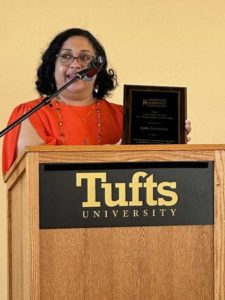AHA University Award Given to Tufts University
 AHA Executive Director Nadya Dutchin at Tufts University
AHA Executive Director Nadya Dutchin at Tufts University On November 2, 2022, the American Humanist Association (AHA) presented the 2022 University Award for Philosophical Diversity to Tufts University. The award celebrates the expression of humanism in higher education. It was presented by AHA Executive Director Nadya Dutchin to Anthony Monaco, President of Tufts University, at an in-person ceremony on the University’s campus.
Interfaith work is an important bridge-builder during this difficult time in our socio-political landscape. The Humanist Chaplaincy at Tufts has done an exemplary job of not only serving secular students but bringing together students from other religious minorities to reimagine a future where all people belong. From hosting an “Unlearning” event that explored the decolonization of students’ thoughts and social norms to working with Sikh students to create art together, the AHA is proud to recognize Tufts University for fostering an environment where collaborations are encouraged to better support their student body.
“The Humanist Chaplaincy at Tufts has been a thriving hub for the rigorous and creative exploration of religious and philosophical differences. As a higher education chaplaincy, we are strategically positioned to realize a more just and interdependent world by supporting students in a critical time of exploration and identity formation,” says Anthony Cruz Pantojas, Humanist Chaplain at Tufts University. “As the first Afro-Boricua Humanist Chaplain, I aim to embrace the complexities of the human condition through narratives and experiences with students and create anew what has been historically erased or obscured.”
The AHA created the University Award to recognize colleges and universities that foster a culture of openness and academic inquiry that allows humanism and a diverse array of other philosophical perspectives to flourish. Previous universities recognized with this award include Pitzer College, Carnegie Mellon University, Stanford University, and the University of Miami. By offering the award, the AHA aspires to counter the prejudice faced by humanists and other nontheists who are good without a god as well as to encourage schools to include humanist chaplaincies on campus.
Established in 2014, the Tufts Humanist Chaplaincy was formed to foster more institutional support for this community and to attend to the many changing needs of students across the nonreligious spectrum. Students from all walks of life seek out the Humanist Chaplaincy for individual support, to gather as small groups, and to host larger programs engaging with contemporary questions around humanism and modern spirituality. Cruz Pantojas explains that the chaplaincy serves as the homeplace for students to discover, explore, interrogate and live their lives in exciting and capacious ways during their time at Tufts. “As one of the few humanist communities of practice in higher education, we aspire to co-create a future of radical interdependence, liberation, and meaningful accountability.”
Commented Dutchin, “We are delighted to recognize Tufts University and their ongoing commitment to the representation of secularism and humanism on campus. It is vital that higher educational institutions encourage an open dialogue between different worldviews and philosophies, both religious and nonreligious.”
